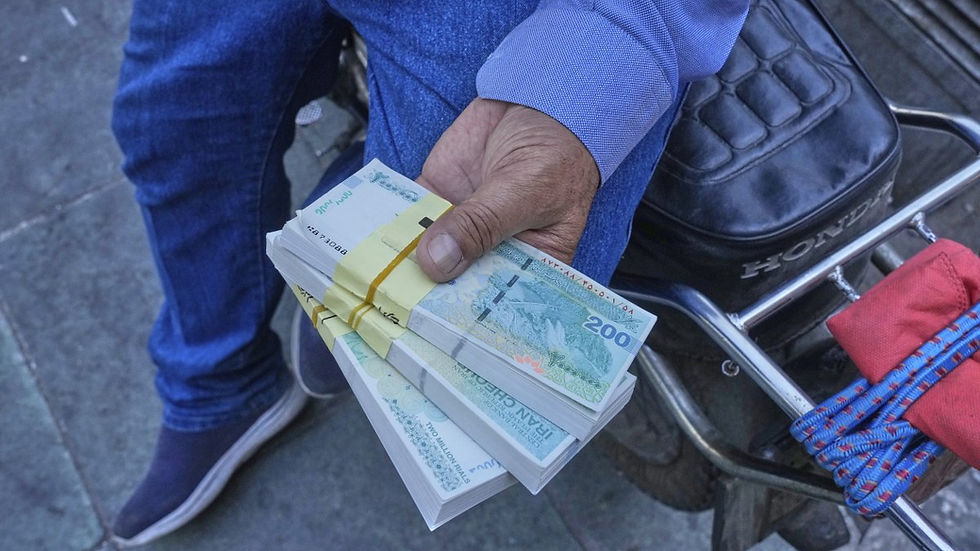Europe moves to reimpose UN sanctions on Iran amid nuclear tensions
- jasonmoorebox
- Aug 28
- 3 min read

France, Germany, and the United Kingdom on Thursday triggered a mechanism to reimpose United Nations sanctions on Iran over its nuclear program, deepening Tehran’s isolation after repeated Israeli strikes on its atomic sites during a 12-day war.
The “snapback” process, built into the 2015 nuclear deal with world powers, is designed to bypass vetoes at the U.N. and could take effect within a month.
If implemented, it would freeze Iranian assets abroad, halt arms deals, and penalize ballistic missile development – further straining a struggling economy already battered by sanctions and inflation.
The move initiates a 30-day window for negotiations. European diplomats framed the measure as a diplomatic lever rather than a punitive action.
“This measure does not signal the end of diplomacy: we are determined to make the most of the 30-day period that is now opening to engage in dialogue with Iran,” French Foreign Minister Jean-Noel Barrot wrote on X.
Iran reacted angrily. Foreign Minister Abbas Araghchi labeled the move “unjustified” and “lacking any legal basis,” warning that Tehran would respond appropriately.
Hours later, the Iranian Foreign Ministry said the action would “gravely undermine” its cooperation with the U.N. nuclear watchdog, the International Atomic Energy Agency (IAEA).
Past threats from Iran have included withdrawing from the Nuclear Nonproliferation Treaty, echoing North Korea’s 2003 exit and subsequent nuclear development.
European officials had warned in August that Tehran could trigger the snapback after halting IAEA inspections following Israeli strikes that targeted top Iranian military leaders and forced Supreme Leader Ayatollah Ali Khamenei into hiding.
The European nations formally initiated the sanctions process through a letter to the U.N. Security Council, requesting closed consultations Friday to discuss Iran’s noncompliance. U.S. Secretary of State Marco Rubio praised the move, emphasizing that snapback “does not contradict our earnest readiness for diplomacy; it only enhances it.”
The decision is likely to intensify tensions between Iran and the West amid ongoing conflicts in the region, including Israeli strikes targeting Yemen’s Iran-backed Houthi rebels. The New York-based Soufan Center noted that Iranian leaders view sanctions as an attempt to weaken the economy and provoke unrest against the regime.
Economic distress in Iran is stark. On Thursday, the rial traded at over 1 million to $1, compared with 32,000 to $1 in 2015. Locals expressed fear and uncertainty over the collapsing currency and the country’s broader nuclear and economic troubles.
Iran continues to enrich uranium at high levels, close to weapons-grade purity, and stockpiles enough material for multiple bombs if it chooses. While Tehran maintains its program is peaceful, Western nations and the IAEA have long suspected an active weapons program, and the recent Israeli and U.S. strikes have left its current nuclear status uncertain.
IAEA inspectors have limited access despite the 2015 accord, which required permanent monitoring at nuclear sites. A fuel replacement at Iran’s Bushehr reactor this week demonstrated partial compliance, though IAEA Director Rafael Grossi called full access “a work in progress.”
The snapback window expires Oct. 18, after which any sanctions move could be blocked by Russia or China, both past supporters of Tehran.
Moscow and Beijing have proposed a six-month extension of U.N. sanctions relief. Russia criticized Europe’s move as an “impudent attempt” to manipulate the U.N., arguing that Western nations violated the 2015 deal by imposing unilateral sanctions and claiming European action lacked legal authority.
Russia urged diplomacy over confrontation, warning that the European approach “holds no future prospects” and could trigger “irreversible consequences.”




Comments